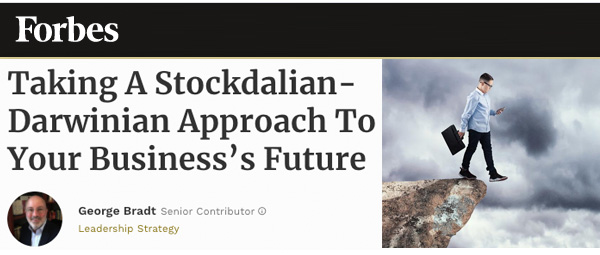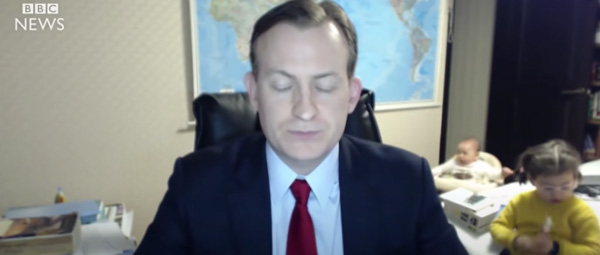Four For the Week (44TW) is back for our second week, In case you missed the first 44TW, you can find it here.
In our second edition, we begin with a tip of the hat to Doris Kearns Goodwin’s bestseller that explores the intersection of leadership and difficulty through the lives of four men who once led our nation. Next Admiral Stockdale’s famous paradox, observed while a Vietnam POW, on the importance of facing the truths of the present while remaining optimistic about the future. Next, McKinsey has a new research report on Coronavirus for P&C insurers. Last, for #4 this week we handed the keyboard to our COO and gave him carte blanche. We should have known what would happen.
1) Leadership… in Turbulent Times
People & Leadership
Wes Bright, Product Leader
 “It is not in the still calm of life, or the repose of a pacific station, that great characters are formed,” Abigail Adams wrote to her son John Quincy Adams in the midst of the American Revolution. “the habits of a vigorous mind are formed in contending with difficulties. Great necessities call out great virtues.” – Abigail Adams
“It is not in the still calm of life, or the repose of a pacific station, that great characters are formed,” Abigail Adams wrote to her son John Quincy Adams in the midst of the American Revolution. “the habits of a vigorous mind are formed in contending with difficulties. Great necessities call out great virtues.” – Abigail Adams
“Great necessities call out great virtues.” Abigail Adams’ words ring as true today as when she first wrote them down 250 years ago. It is often in the difficult times that leadership is formed. Without ignoring the significant hardship this
season brings (more on that below), can you consider your present experience within this frame offered by Abigail Adams?
In Leadership in Turbulent Times, Doris Kearns Goodwin profiles four presidents’ lives in all their forms— from early life, to pivotal experiences of loss or failure and the growth that ensued, to pivotal periods of accomplishment and the keys to their successes.
Tim Kaine, in reviewing the book for the Washington Post, noted the greatness of these four presidents was that “they possessed an outsize passion to do good for others and believed that American greatness was measured by our capacity to exceed simple self-interest.”
Do the leaders shape the times or do the times shape the leaders?
2) The Stockdale Paradox in 2020
Decisioning & Outcomes
Ven Shanmugam, President & COO
“Unwavering faith that you can and will prevail with the discipline to confront the most brutal facts of current reality.” – The Stockdale Paradox
Running a business has its challenges. Trying to do so in the midst of a crisis may be even more daunting. Many companies are prepared for it, through established business continuity and disaster recovery plans. But how prepared are we in an unprecedented global pandemic?
Overcoming these challenges has as much to do with one’s mindset as it has to do with any established processes. This is where the Stockdale Paradox may help shed some light. Named after James Stockdale, a former naval officer and Vietnam prisoner of war, the Stockdale Paradox is a concept popularized by author Jim Collins in his book “Good to Great”.
In short, Rear Admiral Stockdale, while held as a POW, developed a strong mindset of “facing the brutal truth” as opposed to the ever “optimist”. An optimist may wait for a crisis to pass and for better times to come in the near future. However, doing so keeps them blinded from what may truly lie ahead in a crisis.
Especially during these times, many industries will be changed forever, as people learn how to live differently. In the insurance industry for instance, people are driving less as they leverage digital technologies. Customers are more cost conscious, and more willing to shop around for cheaper insurance.
There are plenty of other similar examples. But the key is to be open to considering how different the future may look, and embracing change to lead into this future.

3) Coronavirus response: Short- and long-term actions for P&C insurers
What’s Now & Next
Wes Bright, Product Leader
 We’ll leave it to McKinsey to describe the impact of this pandemic across all lines of insurance. However, we found this paragraph to be worthy of the highlighter:
We’ll leave it to McKinsey to describe the impact of this pandemic across all lines of insurance. However, we found this paragraph to be worthy of the highlighter:
“Accelerate automation and digital transformation. If ever there was a time when intermediaries and policyholders might be willing to abandon paper and move online, that time is now. This opportunity can represent the tipping point. Carriers can lean in by promoting digital channels for all segments of the value chain, from equipping agents with remote capabilities to driving distinctive customer engagement through digital payments, submissions, and claims. It is also important to acquire and develop the appropriate technical skills to interact with customers on their terms and to meet their evolving needs.“
The term “digital transformation” has the paradoxical ability to say a lot and a little at the same time. Moving beyond the jargon, the opportunity-at-hand transcends operational readiness should another pandemic event occur. This is about the acceleration of the digital customer experience to the point that most of the world is now in scope. Openness to new technologies and ways of interacting is going viral itself. Grandparents are initiating calls on Facetime and Houseparty, ordering groceries online, and streaming Netflix.
For context, the video chat party app Houseparty has 50 million new sign-ups over the past month. The use of Microsoft Teams video chat service is up to 2.7 billion meeting minutes, and Zoom has grown from 10 million users to more than 200 million since the outbreak.
The question we should be asking is, “Will everything return to normal when all this is over?” While we don’t see offices going away, we’re pretty sure the access, convenience, and network effects these newly discovered technologies provide will prove to be too valuable to discard.
4) WFH –> LOL
Technology & Connectedness
Claimatic Team
Last, a flashback to this video from 3 years ago. Certainly humorous, especially for parents who are presently working from home. Who would have thought then that this would become the norm?

Enjoy…and don’t forget to lock your “office” door!


